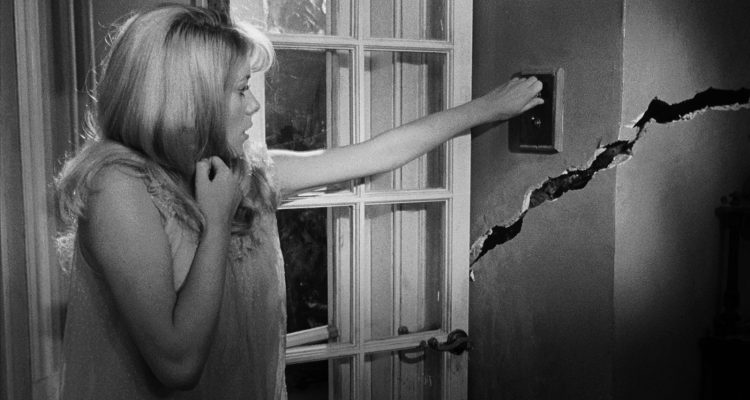People having panic attacks talk about the sensation of the walls closing in, a feeling with which this critic is not totally unfamiliar, but lately, it’s been more like they’re alive.
If I time everything correctly, I only have to venture out beyond the confines of my clean (well, sanitary) apartment and into the viral wilds of New York once per week to replenish supplies of groceries and red wine. That means that in the best-case scenario, the body will remain in what an optimist would generously describe as a “cozy” space for one-hundred-and-sixty-ish hours at a time. Even with good quarantine-mates to bolster my sanity with their company, the psychological axis-tilt has been perceptible. This is not how man was meant to live. How anyone has cared for a youngster during this time without resorting to violence eludes my comprehension. How anyone does it alone constitutes my worst nightmare — a nightmare realized before my very eyes in vivid and specific fashion with last week’s first-time viewing of “Repulsion.”
READ MORE: ‘It Comes At Night’s’ Bleak Realism Terrifies More Than Ever During A Global Pandemic
The full extent of my knowledge going into the screening covered Catherine Deneuve being the star and her character having some deep aversion to men. What wasn’t known was this film reproduces with uncanny accuracy the tortured mental interiority of someone confined in an apartment for fear that leaving its safety will result in certain death, agoraphobia undergirded by a very real external threat. No one was warned that at the height of her mania, Deneuve nearly gets devoured by the walls that crack open to scream at her. Garden-variety projection has turned every movie passing through the living room TV into a covert commentary on the continuing COVID clusterfuck, but rarely have the parallels felt so chillingly one-to-one.
The film arrived in 1965 as an uncommonly intense dissection of the fundamental horrors inherent in womanhood, a surprising tack coming from an artist, filmmaker Roman Polanski, now known to many as a sex criminal first and filmmaker second. Deneuve’s Belgium-bred manicurist Carol Ledoux lives her life in a constant state of not-totally-unjustified terror. She regards every man to cross her path as a potential threat, a behavior reinforced by how frequently perfect strangers make unwelcome passes at her. (The final shot implies what any armchair Freuds in the audience would’ve already surmised, that Carol was most likely abused by her father during her girlhood.) The only source of pleasure in Carol’s life comes from the nuns playing soccer in front of her house; they’re feminine, chaste, and most importantly, at a good distance from the hermetically sealed indoors.
READ MORE: ‘Young Ones’ Threatens Us With An Unkind Future Modeled After The Issues Of Today
Carol’s psyche fractures as the ambient menace she perceives in the outdoors gradually invades what could be fairly termed an emotional quarantine. Her roommate/sister brings the contagion in with her by having her boyfriend over. His presence acts as a stressor on deep-seated and superficial levels; the muffled grunts of the couple’s rutting keep Carol up with haunting memories of her own sexual trauma, but she’s just as disturbed by his habit of putting his toothbrush and razor in the water glass she keeps by the bathroom sink. In part, his being there scratches at the tenderest wounds in her soul, but at the same time, it can just be irksome to have other people all up in your shit.
Even when she’s left alone and can feel some relative security, her unyielding anxiety makes basic functioning difficult. In a metaphor meaty by the literal and figurative definitions, Carol removes a rabbit carcass from the fridge one afternoon to prepare for dinner and immediately loses the motivation to follow through. Whether through distraction or procrastination, she spends the rest of her day compulsively reminding herself of everything she finds terrifying by sniffing the clothes her sister’s boyfriend has left behind. Though it makes her gag and eventually puke, she can’t stop immersing herself in her own phobia, like the news-reader constantly clicking around in search of new articles to upset themselves. The sense of control fostered by such neurosis cannot possibly be worth the mental deterioration it accelerates; the rabbit sits out until it spoils, festering with mold and maggots a few scenes later.
READ MORE: ‘Two Days, One Night’ Beautifully Captures The Plight Of The Underpaid “Essential” Worker
Carol succumbs to the phantoms in her head with a grand finale simulating her inner state through dark strokes of surrealism. Arms jut out of the walls to grab at her, and the room itself cleaves in half as if to swallow her whole in an ultimate perversion of the isolation that once reassured her. She channels her unease into homicidal mania, and while I’ve certainly got a ways to go until reaching that fever pitch, I’m not unsympathetic. The not-unfounded paranoia, the suspicion that any new person penetrating your protective shell could carry danger with them, the banality that often undergirds these days filled with unsettling nothing — it’s enough to drive a person mad.

